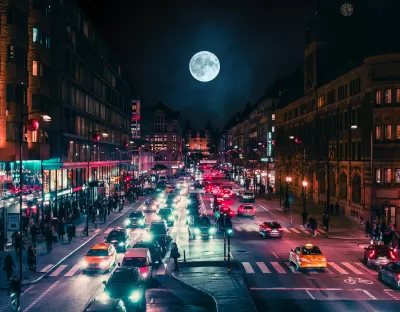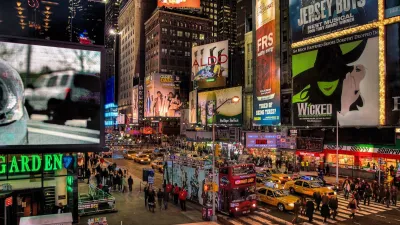More cities are acknowledging the unique role of nighttime activities in urban life and the need for special ‘night governance.’

Writing in Governing, Jess Reia explains why more U.s. cities are hiring ‘night mayors’ to oversee urban nightlife as a “separate, habitable world.”
Reia, who researches nocturnal life, writes that “There’s fear of the dark, safety concerns and noise disturbances. It’s a period that’s ripe for partying, illicit activities and recklessness. And then there are the traditional notions of night: silence, sleep and rejuvenation.” Cities “alleviate some of these fears and facilitate quietude, such as building out a public lighting infrastructure and passing noise codes with special hotlines for noise complaints.”
But nightlife is more complicated. “There have been studies on light pollution and its effects on humans and wildlife, how the shuttering of LGBTQ nightclubs has weakened communities and how late-night venues and businesses spur higher rents.”
Amsterdam became the first city to formally appoint a ‘night mayor’ in 2014, “which set the stage for a bureaucracy of councils, departments and commissions dedicated to governing the city after dark.” New York City followed suit in 2017.
Reia raises concerns about surveillance and privacy as night governance becomes more popular with city governments. “With responsible, careful deployment, however, certain data can be a useful tool for night governance. For example, responsibly tracking movement at night can help cities understand where more nighttime public transit might be useful.”
FULL STORY: Why More Cities Are Hiring ‘Night Mayors’

Maui's Vacation Rental Debate Turns Ugly
Verbal attacks, misinformation campaigns and fistfights plague a high-stakes debate to convert thousands of vacation rentals into long-term housing.

Planetizen Federal Action Tracker
A weekly monitor of how Trump’s orders and actions are impacting planners and planning in America.

In Urban Planning, AI Prompting Could be the New Design Thinking
Creativity has long been key to great urban design. What if we see AI as our new creative partner?

King County Supportive Housing Program Offers Hope for Unhoused Residents
The county is taking a ‘Housing First’ approach that prioritizes getting people into housing, then offering wraparound supportive services.

Researchers Use AI to Get Clearer Picture of US Housing
Analysts are using artificial intelligence to supercharge their research by allowing them to comb through data faster. Though these AI tools can be error prone, they save time and housing researchers are optimistic about the future.

Making Shared Micromobility More Inclusive
Cities and shared mobility system operators can do more to include people with disabilities in planning and operations, per a new report.
Urban Design for Planners 1: Software Tools
This six-course series explores essential urban design concepts using open source software and equips planners with the tools they need to participate fully in the urban design process.
Planning for Universal Design
Learn the tools for implementing Universal Design in planning regulations.
planning NEXT
Appalachian Highlands Housing Partners
Mpact (founded as Rail~Volution)
City of Camden Redevelopment Agency
City of Astoria
City of Portland
City of Laramie





























